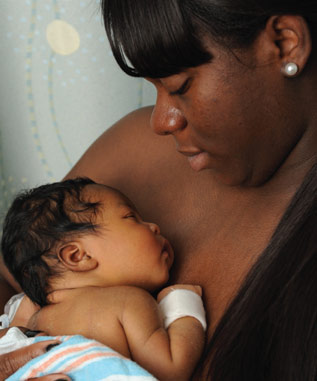SKIN-TO-SKIN NURTURING FOR PREMATURE INFANTS
When an infant is born prematurely or at low birth weight, or is struggling to transition to life outside the womb, he or she is most often placed in an isolette, a special bed that protects against unnecessary and often stressful stimulation. An isolette controls the newborn’s environment by offering a steady temperature and the absence of drafts and other external disturbances that can take their toll on a fragile new life. Along with the use of an isolette comes a process of care called “cluster care” that groups all interruptions and interventions together—things like feedings, diaper changing and medical treatment—so that the newborn experiences fewer disturbances during the early days of life.
The use of isolettes and the practice of cluster care have become a standard in hospital nurseries in the United States. And some newborns do require a rigidly controlled isolette environment early in their stay in a hospital. But even these infants, as they grow and improve, can be connected to a more organic and long-term beneficial source of heat and positive stimulation—their mothers and fathers. This kind of care is now known as kangaroo care.
Kangaroo care began in the late 1970s as a solution to an overcrowded neonatal intensive care unit (NICU) in Bogota, Colombia. The NICU didn’t have enough isolettes available for the number of low-birth-weight infants in its care. In order to provide these newborns with a regulated and warm environment, their mothers were enlisted to be their baby’s source of heat. Each mother reclined comfortably in a chair with her gown or shirt opened to the front. And each infant, wearing only a diaper, was placed in an upright, prone position on his or her mother’s chest for one to three hours at a time. A blanket was draped over mother and baby to help provide temperature stability and privacy.
It soon became clear that the infants being held by their mothers in this manner—skin to skin—were gaining weight more quickly and maintaining their body temperature sooner than the infants who remained in their isolettes. What’s more, the kind of growth these babies experienced meant their time in the NICU was shorter. Given these results, the practice of kangaroo care expanded, soon growing to include healthy infants. And now, kangaroo care includes fathers, grandparents and siblings as providers of warmth and stability.

Though it began as a temporary solution, kangaroo care now holds a respected place in current practice due to the benefits it provides to infants and their families—and even to health care providers. In fact, kangaroo care is part of the standard of care at Barnes-Jewish Hospital and St. Louis Children’s Hospital.
The most significant challenge in caring for infants born prematurely is providing an environment that is most similar to life before birth. Kangaroo care meets many of these challenges by offering not only a heat source but also the stability and comfort of a human heartbeat and voice—things the infant was accustomed to before birth.
Skin-to-skin contact provides a kind of direct heat that infants in an isolette don’t experience. And infants receiving kangaroo care learn to maintain a more consistent body temperature earlier in life by taking cues from the heart and respiratory rates of their holders. In fact, a study published in 2004 found that infants who received kangaroo care maintained heart rates and respiratory rates within normal limits while they rested against a parent or family member.
Infants who receive kangaroo care show an increased ability to sooth themselves and to relax; this is especially true when they experience pain. Another study, published in 2008, found that infants who received kangaroo care 10 minutes before an injection maintained a relaxed breathing pattern and stayed calm or even asleep for the procedure, and their expressions showed little response to pain. Keeping infants calm during their hospital stay prevents a loss of calories due to unnecessary stress and preserves energy needed for growth and development.
Kangaroo care also makes breast-feeding more organic. The time a mother and her baby spend in direct contact provides the stimulation needed to produce larger, more consistent volumes of breast milk during feedings and breast-pumping sessions. During kangaroo care, infants can easily access their mothers’ breasts for feeding. As a result, there are fewer barriers between the moment the infant indicates hunger and the satisfaction of that hunger. This reinforces a strong feeding pattern and builds confidence in breast-feeding for both mother and her infant.
The use of an isolette, which represents a physical barrier to families, also can affect the bonding between baby and parents that typically begins at birth. Kangaroo care removes that barrier, and the time spent in skin-to-skin contact allows family members to have close and intimate time with their newborn. They can be involved in the care of an infant who is not yet able to be taken home. As a result, parents report feeling satisfaction in being needed by nurses and playing an important role in helping their newborn transition from life in the NICU to life at home.
Kangaroo care also can be helpful for nursing staff and can improve the overall level of care in the NICU. When a mother is holding her infant, she can be a part of the team that observes and reports on the status of her baby; she may be able to observe what a nurse caring for multiple infants may not.
The bonding time kangaroo care offers means that parents and family more quickly gain the confidence they need to care for the new family member. They are often more able to manage their baby’s care on their own and move more quickly toward their goal—taking their baby home.